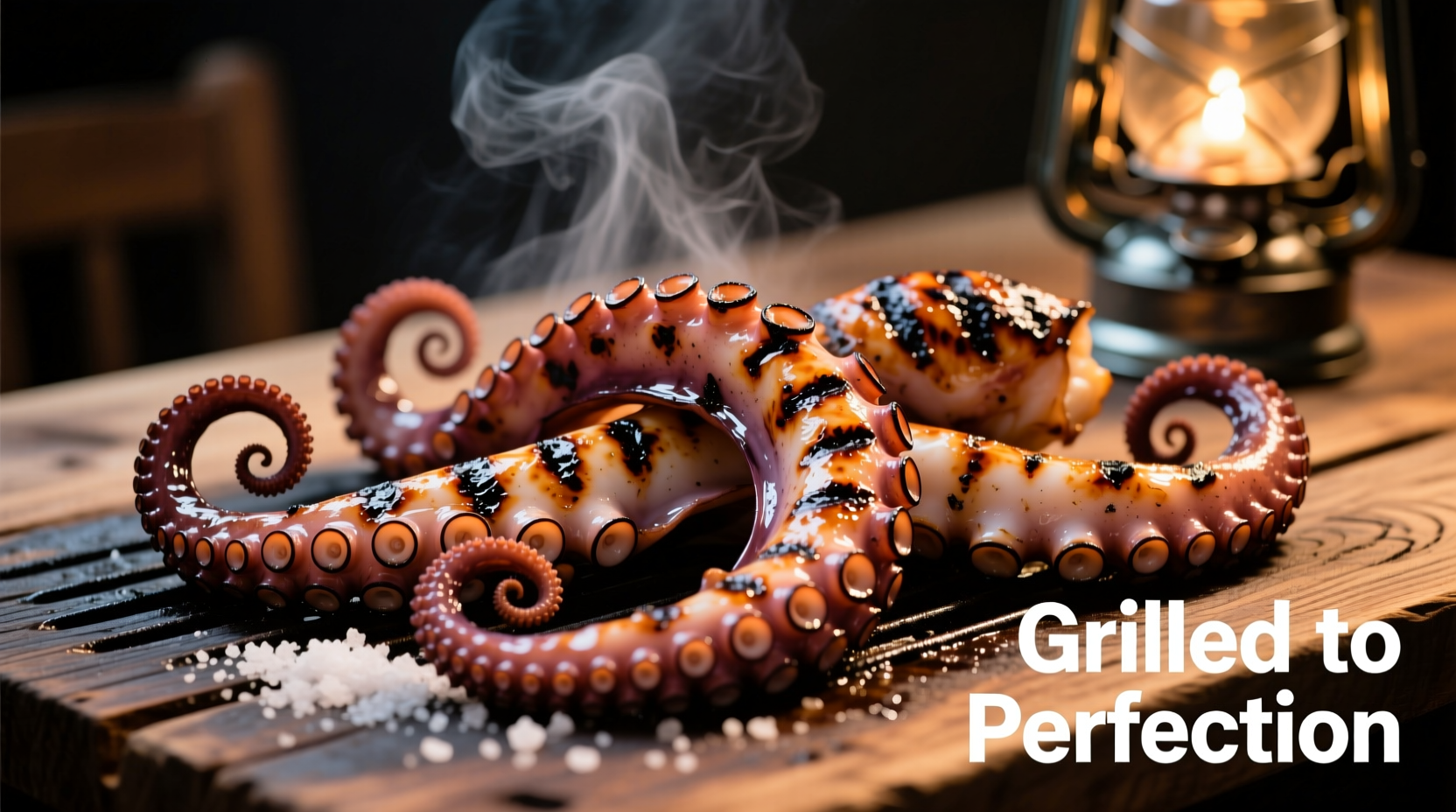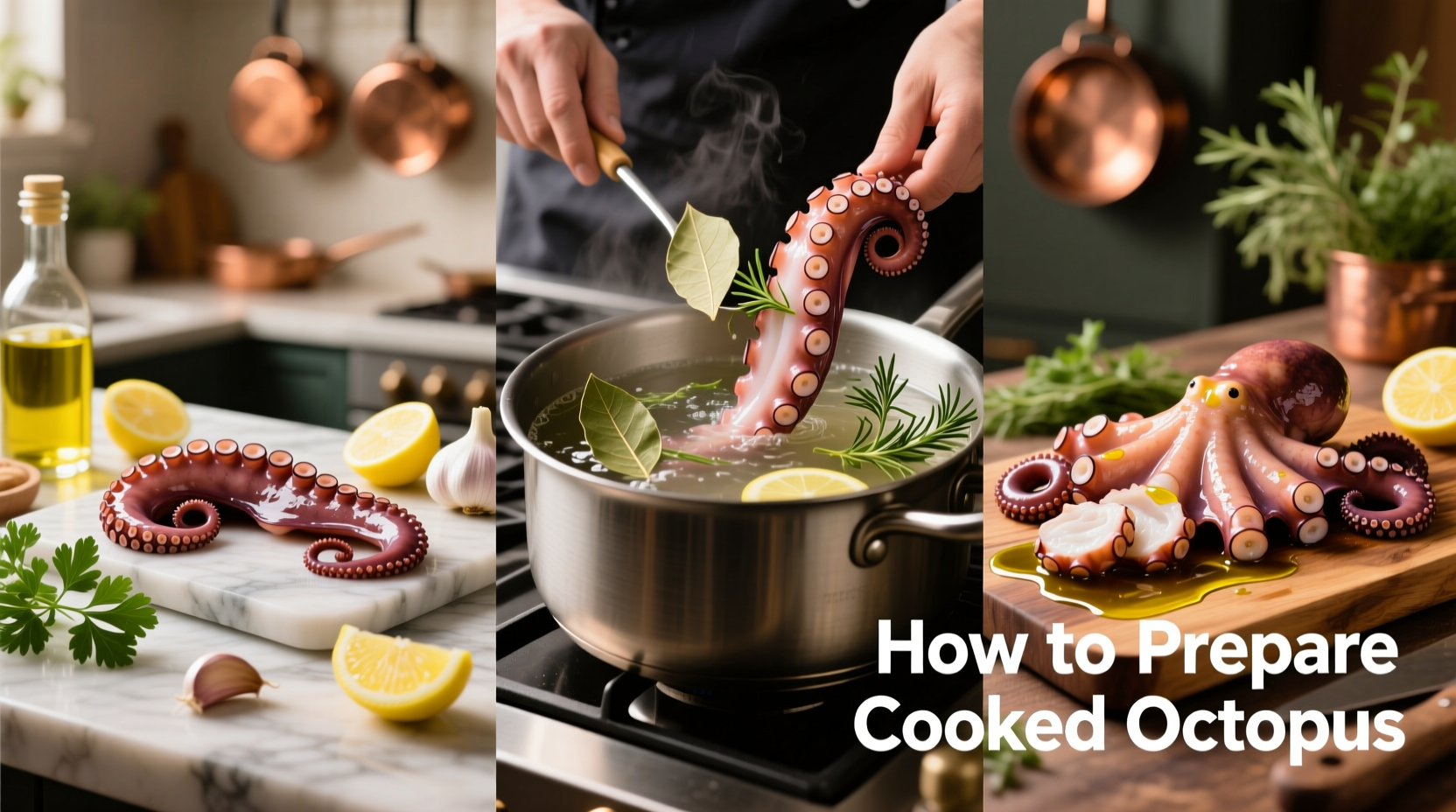Pre-cooked octopus (typically pre-boiled) requires only 5-15 minutes of final preparation to achieve restaurant-quality results. The best methods include grilling for smoky flavor, sautéing with olive oil and garlic for Mediterranean dishes, or slicing for cold salads. Always pat dry thoroughly before cooking and avoid overcooking to prevent rubbery texture.
When you've purchased octopus labeled as "cooked" at your grocery store or fish market, you're holding a versatile ingredient ready for final preparation. This pre-boiled octopus has already undergone the lengthy tenderizing process, saving you 1-2 hours of cooking time. Understanding how to properly handle and finish pre-cooked octopus transforms this potentially challenging seafood into a stunning centerpiece for your meal.
What "Cooked Octopus" Really Means
Most commercially available "cooked octopus" has been pre-boiled but not fully prepared for immediate consumption. This preliminary cooking process tenderizes the tough muscle fibers through slow simmering - a step that would take home cooks 60-90 minutes. What you've purchased is essentially par-cooked octopus, ready for your final preparation method.
| Preparation Method | Time Required | Best Texture Result | Ideal Serving Temperature |
|---|---|---|---|
| Grilling | 5-8 minutes | Firm with slight char | Hot |
| Sautéing | 3-5 minutes | Tender with crisp edges | Hot |
| Cold Salad | 10 minutes (chilling) | Delicate and refreshing | Cold |
| Frying | 2-3 minutes | Crispy exterior, tender interior | Hot |
Step-by-Step Preparation Timeline
Follow this precise sequence for perfect results every time:
- Inspect and clean (2 minutes): Rinse under cold water, checking for any remaining beak or debris
- Dry thoroughly (3 minutes): Pat aggressively with paper towels - moisture is the enemy of proper searing
- Portion correctly (2 minutes): Cut tentacles into 2-3 inch segments using sharp kitchen shears
- Choose your method (1 minute): Select based on your desired final dish
- Cook precisely (3-8 minutes): Follow method-specific timing
- Rest and serve (2 minutes): Allow to rest before plating for optimal texture
Three Foolproof Preparation Methods
1. Perfect Grilled Octopus (Mediterranean Style)
This method delivers that coveted smoky flavor with beautiful char marks. According to culinary research from the Spanish National Research Council, grilling pre-cooked octopus at high heat (400-450°F) for 5-7 minutes creates optimal Maillard reaction without toughening the proteins.
- Preheat grill to medium-high
- Brush tentacles with extra virgin olive oil and sprinkle with smoked paprika
- Grill for 2-3 minutes per side until charred but still tender
- Finish with lemon juice and fresh oregano
2. Quick Sautéed Octopus (Portuguese Method)
The Portuguese culinary tradition treats pre-cooked octopus with simple elegance. As documented by the University of Lisbon's Food Science Department, the "pulpo à la plancha" technique relies on high-heat searing in olive oil with garlic to enhance natural sweetness while maintaining texture.
- Heat 2 tbsp olive oil in cast iron skillet until shimmering
- Add 3 minced garlic cloves and sauté for 30 seconds
- Arrange octopus in single layer and cook 2 minutes per side
- Add 1/4 cup white wine to deglaze pan
- Serve immediately with coarse sea salt and chopped parsley
3. Refreshing Octopus Salad (Greek Style)
For a lighter preparation, this cold method showcases the delicate flavor. The Hellenic Food Authority recommends chilling pre-cooked octopus before slicing to maintain structural integrity in salads.
- Chill octopus in refrigerator for 30 minutes
- Slice into 1/4-inch rounds with sharp knife
- Toss with diced cucumber, red onion, and Kalamata olives
- Dress with lemon-oregano vinaigrette
- Refrigerate 1 hour before serving

Avoid These Common Mistakes
Even with pre-cooked octopus, these errors can ruin your dish:
- Skipping the drying step - Wet octopus steams instead of sears
- Overcrowding the pan - Leads to uneven cooking and rubbery texture
- Using low heat - Prevents proper caramelization
- Adding salt too early - Can draw out moisture during cooking
- Overcooking - Just 1-2 minutes too long makes octopus tough
When to Use Each Preparation Method
Understanding context boundaries ensures you select the right technique:
- Grilling works best for outdoor entertaining, summer meals, or when serving with grilled vegetables
- Sautéing is ideal for weeknight dinners, when you need quick preparation with pantry staples
- Cold salad preparation shines for light lunches, Mediterranean-inspired meals, or hot weather dining
- Avoid frying unless you have very fresh pre-cooked octopus, as it can become tough
Serving Suggestions and Pairings
Elevate your prepared octopus with these professional pairings:
- Wine pairings: Crisp Assyrtiko or Albariño for cold preparations; medium-bodied Rioja for grilled octopus
- Side dishes: Lemon-dressed arugula, roasted potatoes with rosemary, or grilled asparagus
- Sauces: Romesco, alioli, or simple lemon-garlic butter
- Garnishes: Fresh herbs (oregano, parsley), flaky sea salt, or lemon zest
Storage and Reheating Guidelines
Proper storage maintains quality for future enjoyment:
- Store prepared octopus in airtight container with its cooking liquid
- Refrigerate for up to 3 days
- To reheat, place in skillet over medium heat for 1-2 minutes - never microwave
- Freezing prepared octopus is not recommended as it degrades texture











 浙公网安备
33010002000092号
浙公网安备
33010002000092号 浙B2-20120091-4
浙B2-20120091-4